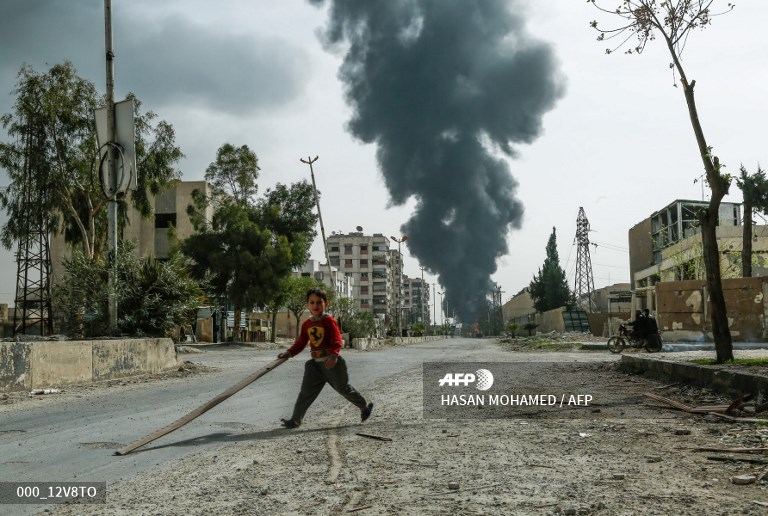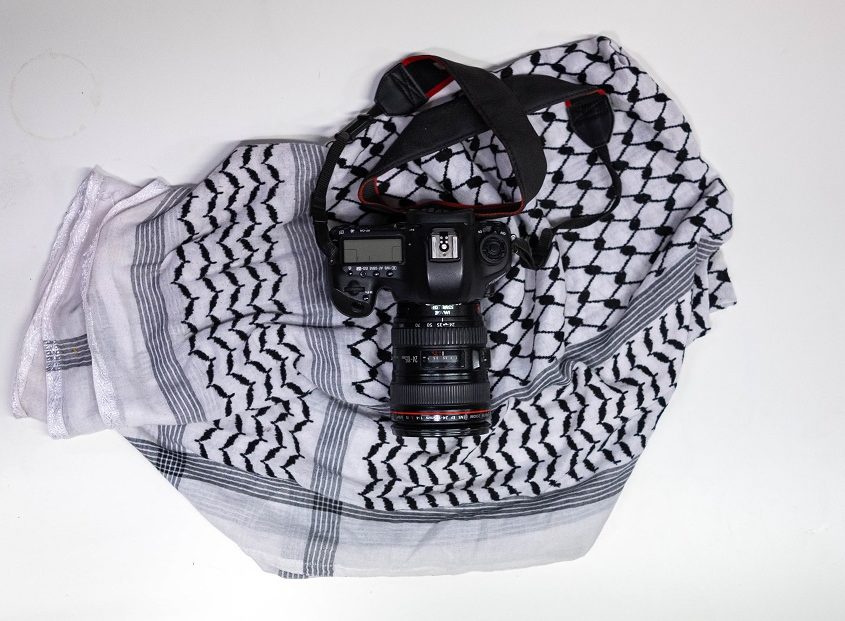Hasan, a detached look in the eyes, a wristband to the colors of the Free Syrian Army, is struggling to remember of any independent journal: “At least, I am certain that there no media covering of what happened in the country.” In February 2011, Hasan is 21, he is living in Douma in the east suburb of Damas. While he is finishing a tourism degree at university, the still nascent Arab revolutions, found an echo in the syrian social medias.
The next month, protests where organizing on Internet, in the streets only a few hundreds of demonstrators but the repression is severe. Yet the feeble processions of the beginning where increasing from a week to another, the repression cements the protest and the social medias do the rest. Hasan feel the need to cover the events “To show what is really happening there.” He starts with other journalists activists filming the gatherings and posting the videos on Facebook or Youtube in the evening. In the protestations, cameras were prohibited and impound by the mukhabarats (regime secret services) but impossible to prohibit smartphones.

From 2012, slaughters and tortures committed by the regime forces and its militias seal the fate of the country: dozens of thousands have been marching, despite the threats, in the streets of Damascus. »Bashar must leave », it will be a revolution. During the summer, the government lost control, the siege formed. Three areas controlled by various revolutionary groups appear, Douma will be the last city held by the rebels 8 years later.
Once the Ghouta isolated, tap water has been quickly cut by the regime. In order to assure the needs of the population, the solution was to collect soil water by some holes 40 to 60 meters deep in the ground. “To pump the water, we used engines but soon it the energy ran out as well. Drawing water manually was not enough, then we began using all the energy sources we could find: plastic bags, cooking oil and even margarine.”
Hasan joined in 2013 the Douma hospital team, he photographed the wounded, including many children, and the surgeries. The suburb hospital transformed into a war hospital and organized in services. A day of April, wounded persons came with unusual symptoms, eyes cornea and respiratory mucosa burnt, suffocation, nausea and vomiting: Bashar al-Assad experiment the chlorine gas and sarin gas on the rebel populations. (1) Following the chemical attack of April 2013, international medias started to take interest on the Douma.
Between 2011 and 2013, it is at least 110 actors of the information that have been killed in the conflict according to a report of Reporters without borders. (2) Facing the happening, international medias decided to stop sending reporters on the field. The AFP then launch a program named »Citizen journalists », the objective is to recruit and form syrian photojournalists from the Beirut bureau.
Hasan is contacted later after a bombing in a market of Douma in August 2015, the AFP provides a camera and give him a training on photojournalism by Internet. (3) From this moment, Hasan photographies began to illustrate French medias tackling the casualty assessments of the life in Douma.
Medical staff
Patients
Medical facilities #NotATarget#Syria: We further reiterate our call and insist on the need for medical evacuations to be allowed out of #EastGhouta https://t.co/TXW1os3uVO— MSF International (@MSF) February 23, 2018
In November 2017, bombing become randoms and unpredictable.
“The regime wages us a physic and psychologic war, you are never in peace, never safe. At this time, we could only live in the basements”.
A shell fell, the rescue come to extract the victims from the rubble, then a few minutes later, a second detonation, a new strike, targeting this time the rescue.
In February 2018, the noose is tightening around Douma, the bombing intensify again. The towns of Mesraba and Harasta fall. People flee the city. “The regime wanted a total evacuation. If we stayed, it would be the prisons of the regime that awaited us.”
In April, Hasan left his native region to Idlib and then take the direction of Turkey. For ten attempts, he tried to cross the Turkish border, and at the tenth he managed finally to smuggle avoiding the Turkish border guards.
“I had no bearings, no emotions, I could not watch any videos from Syria. With my syrian passport, I was nobody.”
It is the AFP that suggested him an exile to France. The travel without any money or help took 11 months to Hasan. Now he wishes to resume studies in journalism, in France, far away from Syria.

« In November 2017, bombing become randoms and unpredictable. “The regime wages us a physic and psychologic war, you are never in peace, never safe. At this time, we could only live in the basements”
A shell fell, the rescue come to extract the victims from the rubble, then a few minutes later, a second detonation, a new strike, targeting this time the rescue. »


